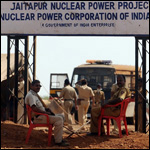New Global Rules for Sensitive Nuclear Trade Mark Hibbs | Carnegie Nuclear Energy Brief
The 46 members of the Nuclear Suppliers Group (NSG) agreed last month on new global terms of trade for uranium enrichment and spent fuel reprocessing technology (ENR). The new guidelines, published this week by the International Atomic Energy Agency (IAEA), represent a patchwork compromise between states most eager to prevent sensitive know-how from proliferating, and others which also fear discrimination by the handful of advanced countries that do nearly all the world's commercial nuclear fuel processing today.
|
|
|
David Axe | Danger Room
China is militarily weaker than many people think, especially compared to America. This, despite lots of showy jet prototypes and plenty of other factory-fresh equipment. But Beijing has a brutally simple — if risky — plan to compensate for this relative weakness: buy missiles. And then, buy more of them. All kinds of missiles: short-range and long-range; land-based, air-launched and sea-launched; ballistic and cruise; guided and "dumb." Full Article
Carnegie Event
The 2012 National Defense Authorization Act recently passed by the House of Representatives includes several provisions affecting U.S. strategic nuclear policy. Congressman Michael Turner, chairman of the House Armed Services Strategic Forces Subcommittee, speaks on the House defense act and its relation to the New START agreement, further nuclear reductions, U.S. nuclear targeting strategy, missile defense, and non-strategic nuclear weapons in Europe. Full Article
Anwar Iqbal | Dawn
Pakistan has in recent years taken a number of steps to increase international confidence in the security of its nuclear arsenal, says a congressional report released on Wednesday. In addition to overhauling nuclear command and control structures since September 11, 2001, Islamabad has implemented new personnel security programmes, the report notes. Both "US and Pakistani officials continue to express confidence in controls over Pakistan’s nuclear weapons," says the Congressional Research Service in the report it sent to Congress. Full Article
Howard LaFranchi | Christian Science Monitor
The two-way talks the United States will hold with North Korea in New York later this week have the announced purpose of gauging Pyongyang's seriousness about resuming long-stalled negotiations on its nuclear-weapons program. But in announcing what she says will be an "exploratory meeting," Secretary of State Hillary Rodham Clinton left unmentioned what may be the US’s primary motivation: a desire to head off any new military provocations by a regime that tends to lash out when it is feeling ignored. Full Article
Sourabh Gupta | CSIS
Much has been written over the past decade about the promise of a transformed US-India strategic relationship, both globally and in Asia. From safeguarding the global commons to promoting the spread of democratic values to preventing the domination of Asia by a single power, this partnership of 'natural allies' is deemed to be 'indispensible' for stability and prosperity in the 21st century. Full Article
|

